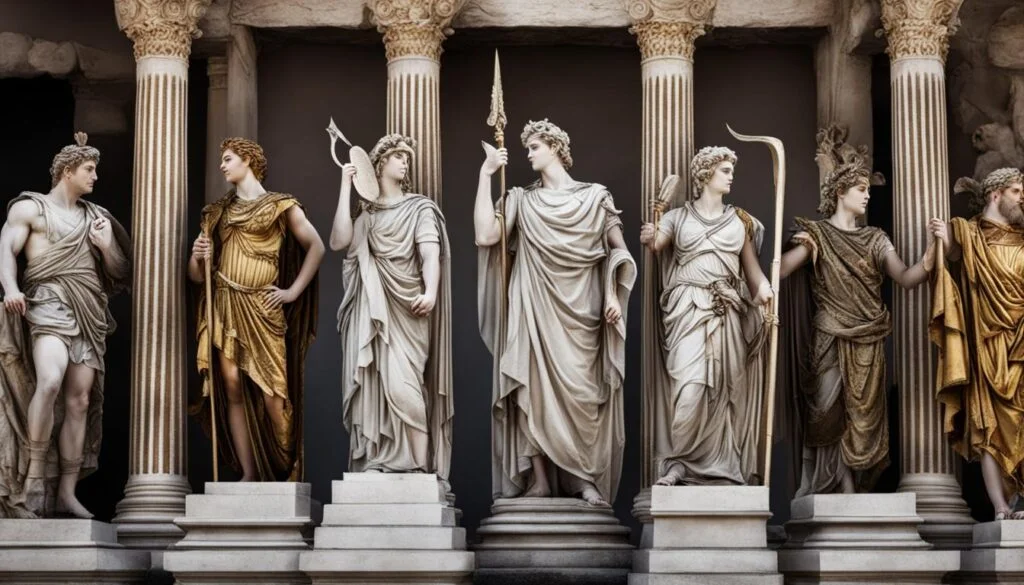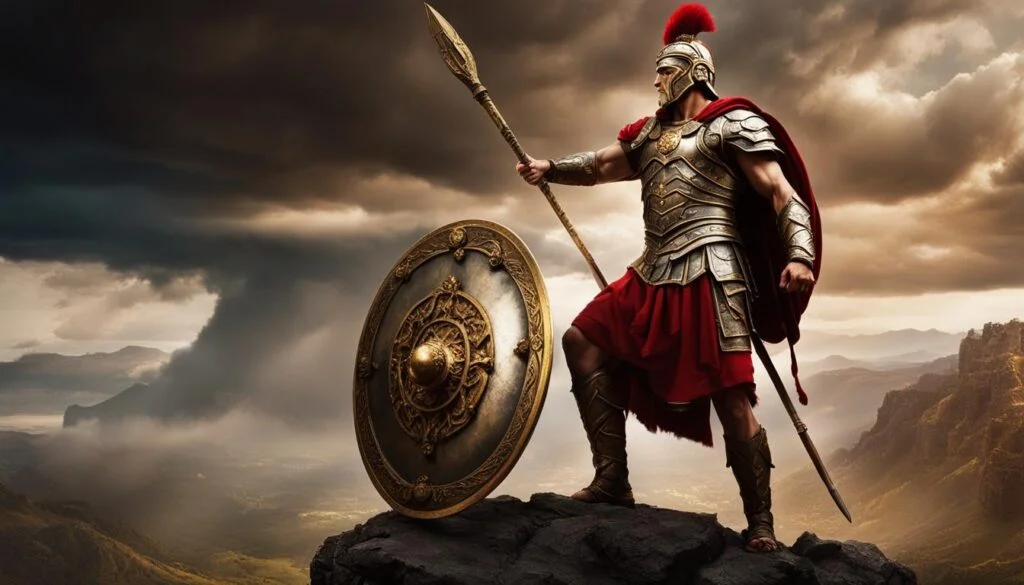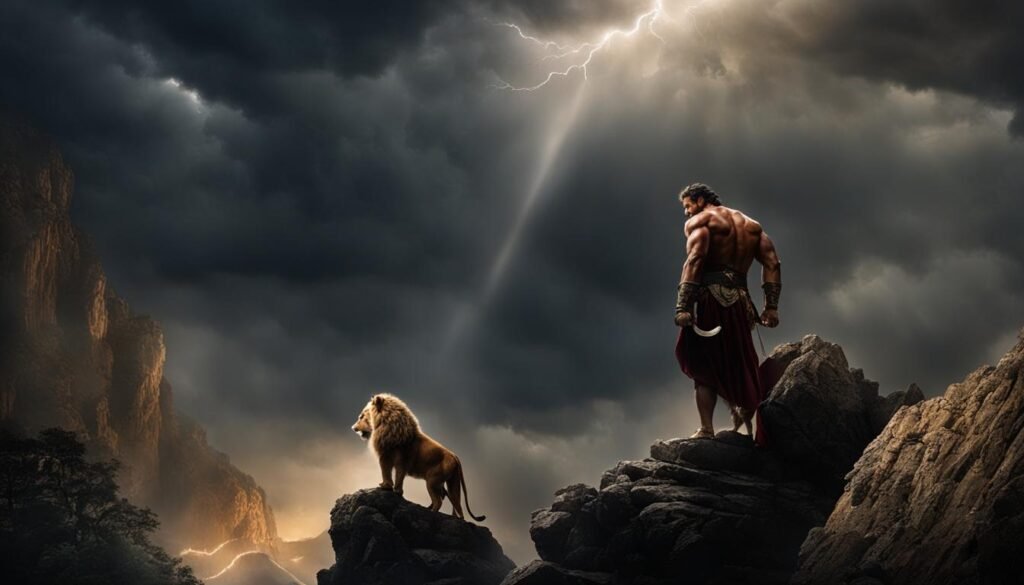Greek and Roman mythology are two fascinating ancient belief systems that have captured our imagination for centuries. While they share some similarities, such as the presence of gods and mythical creatures, there are key differences that set them apart. In this article, we will explore and compare the contrasting features of Greek and Roman mythology, shedding light on their unique characteristics.
As we delve into the world of Greek and Roman mythology, we will examine their time periods, literary sources, physical depictions of the gods, naming conventions, emphasis on mortal deeds, and views of mortals. By understanding how these mythologies differ, we can gain a deeper appreciation for the rich tapestry of ancient beliefs and the cultural influences that shaped them.
Key Takeaways:
- Greek and Roman mythology have distinct differences.
- The time periods, literary sources, and physical appearances of the gods contribute to these differences.
- Naming conventions and emphasis on mortal deeds also vary between the two mythologies.
- Views on mortals differ, with Greeks aspiring to the gods’ favor and Romans aiming for god-like status themselves.
- Some gods and goddesses are more popular in one mythology compared to the other.
Time Period Differences
Greek mythology predates Roman mythology by over 1,000 years. The roots of Greek mythology can be traced back to ancient civilizations, while Roman mythology was developed later, influenced by the Greek myths. The time gap between the two mythologies is significant and has a profound impact on their development and themes.
The tales of Greek mythology, such as Homer’s epic poems The Iliad and The Odyssey, were written approximately 700 years before the formation of Roman civilization. These ancient stories were passed down through generations and shaped the foundation of Greek mythology, with its intricate pantheon of gods and goddesses, heroes, and mythical creatures.
On the other hand, Roman mythology did not emerge until the Roman civilization had already been established. The Romans heavily borrowed and adapted many elements from Greek mythology, incorporating Greek gods and goddesses into their own pantheon, but also added their own deities and legends.
The Chronological Order of Greek and Roman Mythology
- Greek mythology predates Roman mythology by over 1,000 years.
- The earliest works of Greek mythology, such as Homer’s The Iliad, were written around 700 BCE.
- Roman mythology developed later, heavily influenced by Greek mythology, and reached its peak during the Roman Empire.
- Overall, Greek mythology is considered the older and more original mythology.
Greek and Roman Literary Sources: Homer vs. Virgil
In understanding the differences between Greek and Roman mythology, an exploration of their respective literary sources is essential. Greek mythology draws heavily from the works of the ancient Greek poet Homer, particularly his epic poems The Iliad and The Odyssey. These influential literary works are rich sources of Greek myths, legendary heroes, and epic battles. The Iliad, for example, chronicles the events of the Trojan War, while The Odyssey follows the adventures of the hero Odysseus.
Roman mythology, on the other hand, finds its primary literary source in the poem The Aeneid, written by the Roman poet Virgil. This epic poem tells the story of Aeneas, a Trojan hero who escapes the destruction of Troy and embarks on a journey that eventually leads to the founding of Rome. The Aeneid incorporates various elements of Greek mythology, showcasing the blending of Greek and Roman cultural influences.
The Influence of Homer
Homer’s works not only shaped Greek mythology but also had a profound impact on Western literature as a whole. The Iliad and The Odyssey served as foundational texts for Greek culture, inspiring countless subsequent writers and artists. These poems not only propagated Greek myths and gods to a wider audience but also showcased the moral values, heroism, and human experiences that were central to Greek society.
Virgil, in writing The Aeneid, sought to create a Roman counterpart to the epics of Homer. He aimed to legitimize Rome’s claim to greatness by connecting its origins to the ancient world of Troy and Greece. Inspired by Homer’s narrative style and themes, Virgil crafted a story that celebrated Roman virtues and traditions, while intertwining them with Greek mythology.
In conclusion, the literary sources of Greek and Roman mythology provide insights into their unique characteristics. While Greek mythology finds its roots in the works of Homer, Roman mythology draws heavily from the poem The Aeneid by Virgil. These ancient texts have shaped our understanding of these mythological systems, showcasing the enduring power and influence of these literary sources.
Physical Appearances of Gods
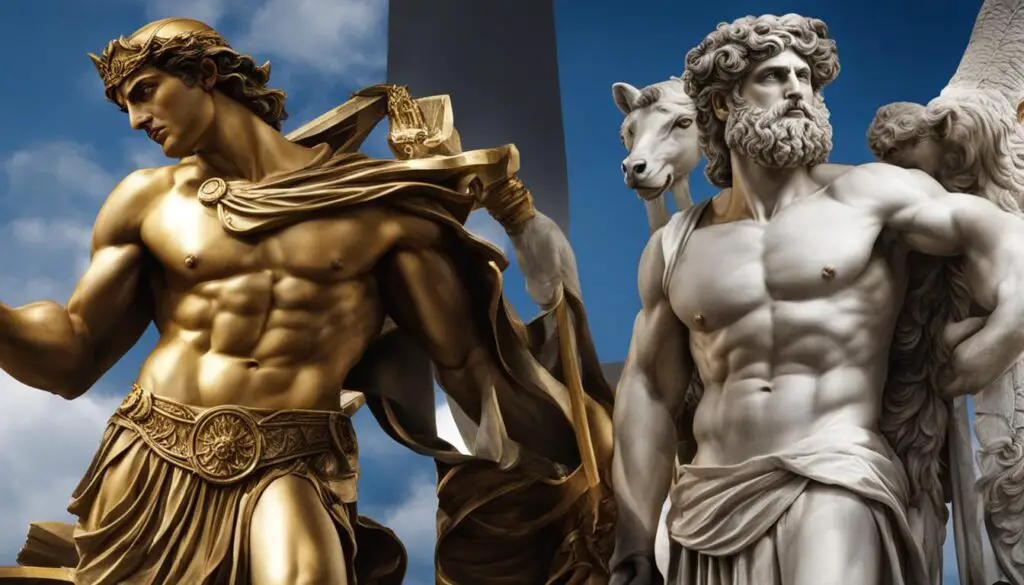
In Greek mythology, the gods are often depicted with great attention to detail when it comes to their physical appearances. Artists and writers describe their features, clothing, and attributes, creating vivid images in the minds of those who hear or read the myths. The Greek gods are portrayed as larger-than-life beings, possessing perfect physiques, captivating beauty, and distinct characteristics. For instance, Zeus, the king of the gods, is often shown with a powerful build, a regal beard, and lightning bolts in his hands, symbolizing his authority and power.
In contrast, Roman mythology places less emphasis on the physical appearances of the gods. Roman gods are often represented by symbols or attributes that represent their powers and domains rather than detailed physical depictions. The Romans were more concerned with the deities’ roles and influence in their daily lives rather than their physical features. This difference in emphasis reflects the cultural and artistic preferences of the Greeks and Romans.
Emphasis on Physical Appearance in Greek Mythology:
- Greek gods are described in great detail
- Artists and writers portray their distinct physical features
- Physical appearances reflect gods’ powers and characteristics
Roman Gods with Less Emphasis on Physical Appearance:
- Roman gods are often represented by symbols
- Physical depictions are less common
- Focus is on gods’ roles and influence in daily life
This contrasting approach to physical appearances in Greek and Roman mythology adds to the unique characteristics and storytelling styles of each.
God Names
In Greek mythology, the gods and goddesses are named based on human characteristics and traits. Each deity’s name reflects their personality, abilities, and role in the mythological world. For example, Zeus, the king of the gods, derives his name from the Greek word “zeus,” which means “bright” or “sky.” Similarly, Aphrodite, the goddess of love and beauty, is named after the Greek word “aphros,” which means “foam,” representing her birth from the sea foam.
In contrast, Roman mythology follows a different naming convention for their gods and goddesses. Instead of deriving names from human qualities, the Romans named their deities after objects. For instance, Mars, the Roman god of war, is named after the planet Mars. This naming convention allows the Romans to represent their gods and goddesses through symbolic associations with tangible entities.
Similarity between Greek and Roman God Names
Despite the differences in naming conventions, there are similarities between the gods and goddesses of Greek and Roman mythology. This similarity arises from the fact that the Romans adopted many of the Greek gods and incorporated them into their pantheon. However, they gave these deities Roman names and attributed them with distinct characteristics associated with Roman culture.
- Example: The Greek god Zeus is equivalent to the Roman god Jupiter. While their names differ, both deities represent the king of the gods and share similar attributes of power and authority.
- Example: The Greek goddess Athena is parallel to the Roman goddess Minerva. Both are goddesses of wisdom and strategic warfare, albeit with slight variations in their individual stories and depictions.
Emphasis on Mortal Deeds
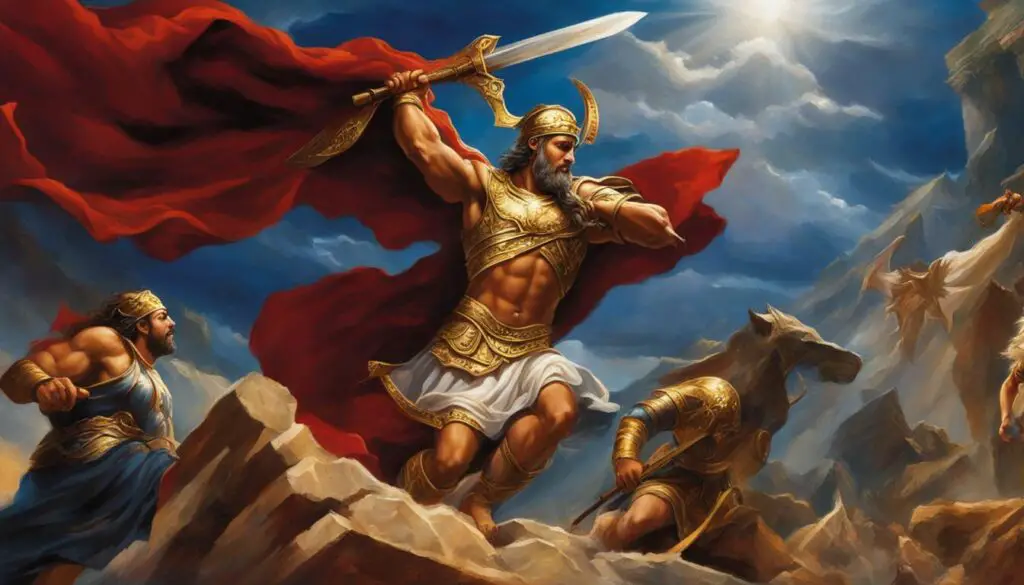
When it comes to Greek mythology, mortal heroes play a crucial role in shaping the narratives and lessons of the ancient tales. These mortal heroes often take center stage, showcasing their courage, wit, and virtues that both captivate and inspire us. Greek mythology puts a significant emphasis on the accomplishments and heroics of these mortal figures, highlighting their journey, challenges, and the impact they make on the world around them.
In Greek mythology, we find figures like Hercules, Theseus, and Perseus, who undertake daunting quests, battle mythical creatures, and overcome tremendous obstacles. They embody the values and virtues that the ancient Greeks held dear, such as bravery, honor, and intelligence. Their feats and actions teach us valuable life lessons and showcase the potential for greatness that lies within all of us.
Mortal heroes in Roman mythology
On the other hand, Roman mythology places less emphasis on mortal heroes and their deeds. While the Romans certainly had their own legendary figures, such as Romulus and Remus, their stories often revolve around the founding and history of Rome itself rather than individual mortal heroes. Roman mythology tends to focus more on the gods and their influence on mortal affairs, with less attention given to the achievements of mortal heroes.
In Roman mythology, the gods are often seen as distant and unattainable beings, and the focus is placed more on worshiping and appealing to them rather than on mortal heroics. The Romans believed that mortals should aspire to be god-like and aim for an afterlife where they can attain divine status. As a result, mortal deeds in Roman mythology are overshadowed by the divine and the pursuit of personal immortality.
By examining the contrasting roles of mortal heroes in Greek and Roman mythology, we gain a deeper understanding of the cultural values and beliefs of these ancient civilizations. While Greek mythology celebrates the achievements of mortal heroes and the impact they have on the world, Roman mythology places more importance on the gods and the pursuit of divine status. Both mythologies offer unique perspectives on mortal life and the role of individuals in shaping their own destinies.
Differences in Mortal Lives
In Greek mythology, mortals are seen as mere mortals who strive to do good works on earth to earn the favor and honor of the gods during their time on earth. They view the deities as unattainable beings, and their lives are centered around performing acts of valor, righteousness, and piety to gain recognition from the gods. The Greeks believe that by living a virtuous life, mortals can achieve a sense of fulfillment and purpose.
On the other hand, Roman mythology has a contrasting view of mortals. Romans believe that mortals should aspire to be like the gods they worship and aim for an afterlife where they can attain god-like status. The Romans envision a life in which mortals can transcend their human limitations and ascend to a higher plane of existence. Their focus is on achieving divinity and immortality through their actions and deeds on earth.
These contrasting views of mortals between Greek and Roman mythology reflect the cultural differences and values of the two civilizations. While the Greeks emphasize the importance of mortal achievements and heroism, the Romans place greater significance on the pursuit of god-like qualities and the attainment of a divine afterlife.
Popular Gods
Within Greek and Roman mythology, there are gods and goddesses who hold varying degrees of popularity. While some deities are revered and highly regarded in both mythologies, others have differing levels of prominence. Understanding the differences in popularity between Greek and Roman gods adds another layer to the rich tapestry of these ancient belief systems.
Greek Mythology
In Greek mythology, the popularity of gods and goddesses often varied depending on the region and the cultural beliefs of the ancient Greeks. However, there were certain deities who held significant importance and were widely worshipped throughout Greece. Here are a few examples:
- Zeus: As the king of the gods and the ruler of Mount Olympus, Zeus was one of the most popular and powerful gods in Greek mythology.
- Athena: Known as the goddess of wisdom, Athena was highly revered for her strategic intellect and her role as the patron of Athens.
- Apollo: The god of music, poetry, and prophecy, Apollo was greatly admired for his artistic talents and his ability to foretell the future.
Roman Mythology
In Roman mythology, the popularity of gods and goddesses often aligned with the needs and interests of the Roman people. Some deities held a higher status in Roman society and played crucial roles in the religious, political, and cultural aspects of Roman life. Here are a few examples:
- Jupiter: As the Roman equivalent of Zeus, Jupiter was considered the king of the gods and held great influence and popularity in Roman mythology.
- Mars: Mars, the Roman god of war and agriculture, was highly venerated as a symbol of Roman strength and military prowess.
- Venus: The goddess of love and beauty, Venus was cherished and worshipped by the Romans for her associations with romance and fertility.
While these gods and goddesses represent only a small selection from each mythology, they highlight the differing levels of popularity and focus within Greek and Roman belief systems. By exploring the popularity of specific deities, we gain a deeper understanding of the cultural values and societal roles assigned to these gods in each mythology.
Greek and Roman Mythology: Origins and Greek Influence on Roman Mythology
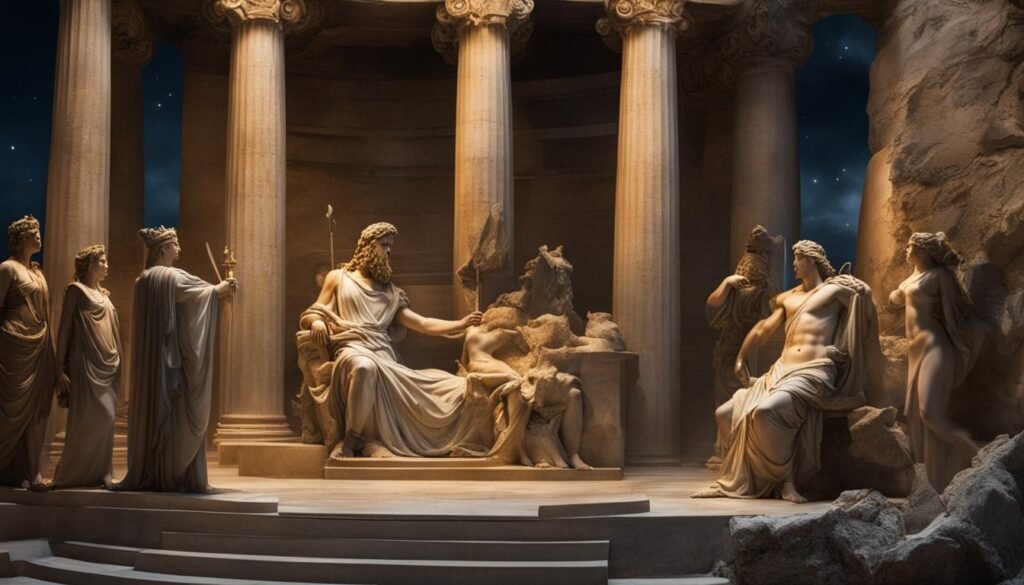
The origins of Greek and Roman mythology are fascinating and intertwined, with Greek mythology predating Roman mythology by several centuries. Greek mythology, in its earliest forms, likely originated from ancient Egyptian mythology, with the Greeks adopting and expanding upon these beliefs and stories. The Greek pantheon of gods and goddesses, along with its rich collection of myths and legends, became the foundation of their mythology.
As the Romans came into contact with Greek civilization, they were captivated by the richness and complexity of Greek mythology. The Romans admired the Greek gods and saw similarities between them and their own deities. This admiration led to the assimilation of many Greek gods into the Roman pantheon, with the Romans giving them new names and attributing them with Roman characteristics.
Greek Influence on Roman Mythology
The influence of Greek mythology on Roman mythology cannot be understated. The Romans not only adopted Greek gods but also incorporated Greek myths and legends into their own storytelling. This influence is evident in Roman literary works such as Ovid’s “Metamorphoses,” which draws heavily from Greek mythology. Additionally, Roman art and architecture often depicted scenes from Greek myths, further highlighting the impact of Greek mythology on Roman culture.
While Roman mythology drew heavily from Greek sources, it also had its unique characteristics and deities. The Romans added their own gods and goddesses to the pantheon and developed distinct myths and stories that reflected their society and values. This blending of Greek and Roman mythology created a complex and diverse mythological tradition that continues to captivate and inspire us today.
Conclusion
Greek and Roman mythology have a shared origin, but they also have distinct differences that make each mythology unique. These differences can be seen in the time periods, literary sources, physical appearances of the gods, god names, emphasis on mortal deeds, and views of mortals.
The time gap between Greek and Roman mythology is significant, with Greek mythology predating Roman mythology by over 1,000 years. This time difference influences the development and themes of each mythology. Greek mythology draws heavily from the works of Homer, such as The Iliad and The Odyssey, while Roman mythology is reflected in Virgil’s poem, The Aeneid.
In Greek mythology, there is great emphasis placed on the physical appearances of the gods, with detailed descriptions and characteristics. On the other hand, Roman gods have less focus on physical appearance, and they are often not depicted visually at all.
Another notable difference is the naming conventions of the gods. Greek gods are named after human traits, while Roman gods are named after objects and do not possess gender. This leads to different names for the same deities in each mythology.
The emphasis on mortal deeds is also distinct between the two mythologies. Greek mythology places great importance on mortal heroes and their good deeds on earth, while Roman mythology focuses more on the afterlife and the aspiration to attain god-like status.
Understanding these differences between Greek and Roman mythology allows us to appreciate the rich and diverse world of mythology. It is fascinating to explore the influences, themes, and unique characteristics that make each mythology a captivating part of human storytelling and history.
FAQ
How are Greek and Roman mythology different?
Greek and Roman mythology share many similarities, but there are also significant differences between the two. These include differences in time periods, literary sources, physical appearances of gods, god names, emphasis on mortal deeds, and the ways mortals in each mythology lived differently.
What is the time period difference between Greek and Roman mythology?
Greek mythology originated over 1,000 years before Roman mythology, with works like Homer’s The Iliad being written 700 years before the formation of Roman civilization.
Which literary sources influenced Greek and Roman mythology?
Greek mythology is heavily influenced by the works of Homer, particularly The Iliad and The Odyssey. Roman mythology is reflected in the poem The Aeneid by Virgil.
How are the physical appearances of gods different in Greek and Roman mythology?
Greek gods are described in great detail, with an emphasis on their physical appearances. In contrast, Roman gods have less emphasis placed on their physical appearances, and they are often not depicted physically at all.
How are god names different in Greek and Roman mythology?
Greek gods and goddesses are named based on human characteristics and traits, while Roman gods and goddesses are named after objects and do not possess a gender. Roman mythology assigns a Roman object to fit the description of the Greek god, resulting in different names for the same deities.
How is the emphasis on mortal deeds different in Greek and Roman mythology?
Greek mythology highlights the importance of mortal Greek heroes and their good deeds on earth. In contrast, Roman mythology places less emphasis on the works of mortal heroes and focuses more on the afterlife.
How are the lives of mortals different in Greek and Roman mythology?
Greeks view deities as unattainable beings, and mortals strive to do good works on earth to earn the honor of the gods during their time on earth. In contrast, Romans believe that mortals should aspire to be like the gods they worship and aim for an afterlife where they can attain god-like status.
Which gods are more popular in Greek and Roman mythology?
Some gods and goddesses are more popular in one mythology compared to the other. For example, the Greek god Ares is not highly regarded, as the Greeks focus more on the goddess Athena for strategic warfare. However, in Roman mythology, Mars, the Roman equivalent of Ares, is a prominent and venerated god.
What are the origins of Greek and Roman mythology?
Greek mythology predates Roman mythology by about 700-1,000 years. Greek mythology may have originated from the Egyptians and was later adapted and expanded by the Greeks. Roman mythology borrowed many gods from Greek mythology and incorporated them into their own pantheon, giving them Roman names and characteristics.


